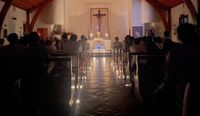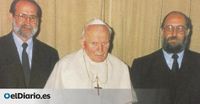The Sodalicio de Vida Cristiana, a controversial religious organization founded in Peru, has officially ceased to exist following a decree signed by its Superior General, José David Correa, on April 14, 2025. This decision comes three months after Pope Francis ordered the dissolution of the group due to serious allegations of abuse and misconduct within its ranks.
The dissolution was confirmed in a statement released by the Sodalicio, which also announced the appointment of Jordi Bertomeu Farnós as the apostolic commissioner responsible for overseeing the suppression process. The statement expressed a heartfelt apology to the victims of abuse committed by the organization's founder, Luis Fernando Figari, and others, stating, "We sincerely ask for forgiveness for the mistreatment and abuses committed in our community. We also apologize to the entire Church and society for the pain caused."
Figari, who founded the Sodalicio in 1971, was expelled from the organization in August 2024 following numerous accusations of physical, psychological, and sexual violence, including against minors. The Sodalicio was canonically recognized as a society of apostolic life by the Vatican in 1997, but its reputation has been marred by scandals for years.
The decision to dissolve the Sodalicio was first hinted at in January 2025 during an assembly in Brazil, where the initial news of the Holy See's actions leaked. However, the formal signing of the decree only took place on April 14, 2025, at the Dicastery for Institutes of Consecrated Life and Societies of Apostolic Life, in the presence of Sor Simona Brambilla, the prefect of the dicastery. The delay in the official announcement was attributed to the need to assess the properties linked to the organization for potential reparations to victims.
In their statement, the Sodalicio expressed gratitude to the laypeople and clergy who had been part of the community, saying, "We trust that the efforts we made in the process of reparations bear fruit, and we will continue to offer our prayers for the Lord to heal the wounds that have been produced." The group emphasized that they are committed to a time of conversion and renewal, hoping that this period will bring healing and a renewed focus on the voice of God.
Victims of abuse have long awaited justice, and many are hopeful that this decision will lead to meaningful reparations. José Ugaz, an attorney representing several victims, stated that the dissolution is a significant step towards accountability for the organization’s actions, which have been described as systematic abuse and predation against hundreds of children and young people over decades.
The Sodalicio’s history is riddled with allegations dating back to the early 2000s, when former members began to speak out about their experiences. Investigations by journalists Pedro Salinas and Paola Ugaz brought to light the abusive practices within the organization, leading to increased scrutiny from the Vatican. In July 2023, Pope Francis sent Scicluna and Bertomeu to investigate the situation, which ultimately revealed the extent of the abuses perpetrated by Figari and other leaders.
As the Sodalicio is dismantled, the Vatican has mandated that all its assets, estimated to be worth over one billion dollars, be used to compensate the victims. This includes the liquidation of properties and funds associated with the organization. The Vatican's decree explicitly states that the process of verification for any violence and abuse suffered by current or former members will be opened, and it aims to equitably compensate the damages endured by victims.
In addition to the Sodalicio, the Vatican has also dissolved its associated branches, including the Fraternidad Mariana de la Reconciliación, the Siervas del Plan de Dios, and the Movimiento de Vida Cristiana, which had been operating in various countries including the United States, Colombia, and Brazil.
Figari, who once held significant influence within the Church and was seen as a charismatic leader, is now viewed as a symbol of the systemic issues plaguing certain segments of the Catholic Church. His organization was often compared to other controversial groups like the Legion of Christ, founded by Marcial Maciel, who also faced numerous allegations of abuse.
The Sodalicio's structure was described as sectarian, with practices that included extreme punishment and manipulation of its members. Reports indicated that followers were subjected to strict controls over their daily lives, including when they could eat or speak. Many victims have come forward to describe the psychological and physical toll that their experiences within the Sodalicio have taken on them.
The Vatican's decision to dissolve the Sodalicio marks a significant moment in the Catholic Church's ongoing struggle to address the legacy of abuse and to hold accountable those responsible for such acts. It remains to be seen how this will impact other similar organizations and whether it will lead to broader reforms within the Church.
As the Sodalicio fades into history, its victims are left hoping that this moment will serve as a turning point for justice and healing. The path to reparations may be long, but the dissolution signals a commitment to confronting the past and ensuring that such abuses are not repeated in the future.










